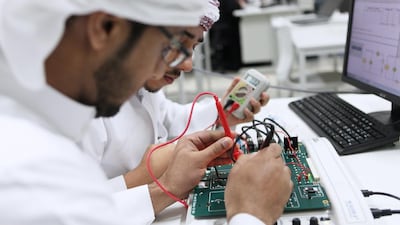Industrials throughout the world have created world-class economies, centres of excellence in manufacturing and have dramatically changed the landscape as we know it in terms of export/import opportunities.
Driven by the nation’s promise to diversify away from its dependence on hydrocarbons, the UAE has a flourishing industrial sector. For the past two decades, the UAE has been developing the infrastructure required to achieve its aim, creating an attractive environment for industrial investment across a range of sectors.
There is no doubt that the UAE, and Abu Dhabi in particular, could compete on a global level. The impressive Expo 2020 win further for Dubai proves the UAE’s ability to be an innovative and cutting-edge contender on the global stage. The UAE’s industrial sector has contributed 14 per cent of the country’s non-oil GDP over the past decade. Abu Dhabi, which is focused on heavier manufacturing industries, plans for the industrial sector to reach 25 per cent of its GDP by 2030. This worthy ambition requires first-class engineers, cutting-edge technologies, international partners and an investment in research and development.
Operating as one of the largest industrial holding companies in the UAE, Senaat is fortunate to be able to build on the natural advantages and leverage the diverse resources of the emirate of Abu Dhabi. However, housing world-class technologies means continually investing otherwise competitors soon catch up. To foster future opportunities, it is vital that we continue to reinvest profits in our next cycle of value generation. The single biggest growth stimulant for a leading industrials industry is creating more engineers. We are already making great strides as a nation to avoid a deficit in engineering graduates, but there is still more to do. Combined with this, we must also ensure we are looking beyond our borders to partner with innovative and forward-looking complementary technologies and businesses. This outlook brings with it some challenges.
I believe there are three areas in particular which need attention for the UAE to continue to be at the forefront of industrial innovation: predatory pricing, access to capital and talent.
Predatory pricing: The world over suffers from the challenge which comes from competitors engaged in predatory pricing, encroaching and at times destroying domestic firms.
When companies undercut and underservice, they not only diminish the pricing policy of competitors but also the reputation of the industry in which they operate. Such activity undermines the rest of the “peer group” and can result in squeezing margins to the extent that some companies do not survive. Therefore, protecting domestic business is imperative and needs to be a priority for government and commerce.
Abu Dhabi has recently set up an Industrial Development and Regulation Bureau to provide advice and protection as well as to demonstrate its commitment to the industrial sector. The bureau, approved by the emirate’s Executive Council, will oversee the implementation of Abu Dhabi industrial strategy, monitor the performance of the industrial sector and catalyse economic development by implementation of policies, plans and programmes related to the sector. The recent creation of such a bureau should help to mitigate the adverse effects of foreign market penetration.
Access to capital: Large-scale industrial production requires significant working capital. In some parts of the world, there is capital specifically allocated to industrial development. The UAE has yet to set this up and therefore the industrial sector is reliant on commercial banks and is competing with the funds required for all other industries in the UAE.
This competition for capital means access to funding for growth, innovation and progress becomes extremely challenging. Banks require guarantees and therefore determine interest rates, tenure of loans as well as what they deem to be acceptable to put down as collateral. Until we have capital specifically set aside for industrial growth, there will be constraints on the growth of the industry as a whole.
Talent: In the past, engineers and scientists became our industrialists for the future. There is a growing trend among engineering and scientific graduates to join the desk-bound financial services industry. This creates a vacuum in the industrials sector of talent.
For a sustainable industrial sector to flourish in the UAE, we need to focus on building a strong talent pipeline among UAE nationals in our country. On the one hand, we lose scientific minds to international business and need to create a meaningful and exciting infrastructure here to bring them back to the UAE. On the other hand, a number of students study overseas and end up staying in their chosen country – this creates a drain of home-grown talent here in the UAE.
I believe that all of these factors are surmountable and we can, together, build a continuous and sustainable industrial centre in the years to come.
Eng Suhail Mubarak bin Athaeeth is the chief executive of the industrial and investment holding company Senaat
Follow us on Twitter @Ind_Insights

